
At the 62nd CRS Annual Conference, held on September 17–19 at the University of Kent (Canterbury), a Ukrainian panel was presented for the first time. It began with a symbolic minute of silence at 9:00 a.m. as an example of a peacebuilding practice, and continued with the presentations of research by Dr. Tetiana Kyselova, Dr. Tetiana Kalenichenko, and Yelyzaveta Rehtman.
The Community of Dialogue Practitioners of Ukraine was represented by Tetiana Kalenychenko, who presented the academic article “Winning the Peace,” co-authored with Dr. Cedric de Coning (Norwegian Institute of International Affairs), Marko Lehti (Tampere Peace Research Institute), and Denys Bryliov (Dialogue in Action, Ukraine / Leibniz-Zentrum Moderner Orient).
“This is a joint effort of academic conflict researchers and Ukrainian practitioner-researchers who are trying to rethink the theoretical vision of peacebuilding,” emphasized Tetiana. “While most theories assume the context of the civil war, we need to develop new formats for studying and understanding the realities of Ukraine. That is why we are glad to collaborate with Cedric and Marko in testing the theory of adaptive peace and agonistic peacebuilding.”

Adaptive peace is an approach that allows peacebuilding actions to be planned more flexibly while constantly checking whether good intentions bring the expected results. One example from practice is the long-term dialogue between Orthodox communities, which shows that even deep conflicts can gradually be transformed into constructive and nonviolent solutions.
.jpg)
We are truly delighted that a fully Ukrainian panel was presented for the first time on the international CRS platform — this opens the way for further development of Ukrainian research and its public representation at the global level.
The article “Winning the Peace: The Role of Agonistic and Adaptive Peacebuilding in Sustaining Social Cohesion in Ukraine” is available here.